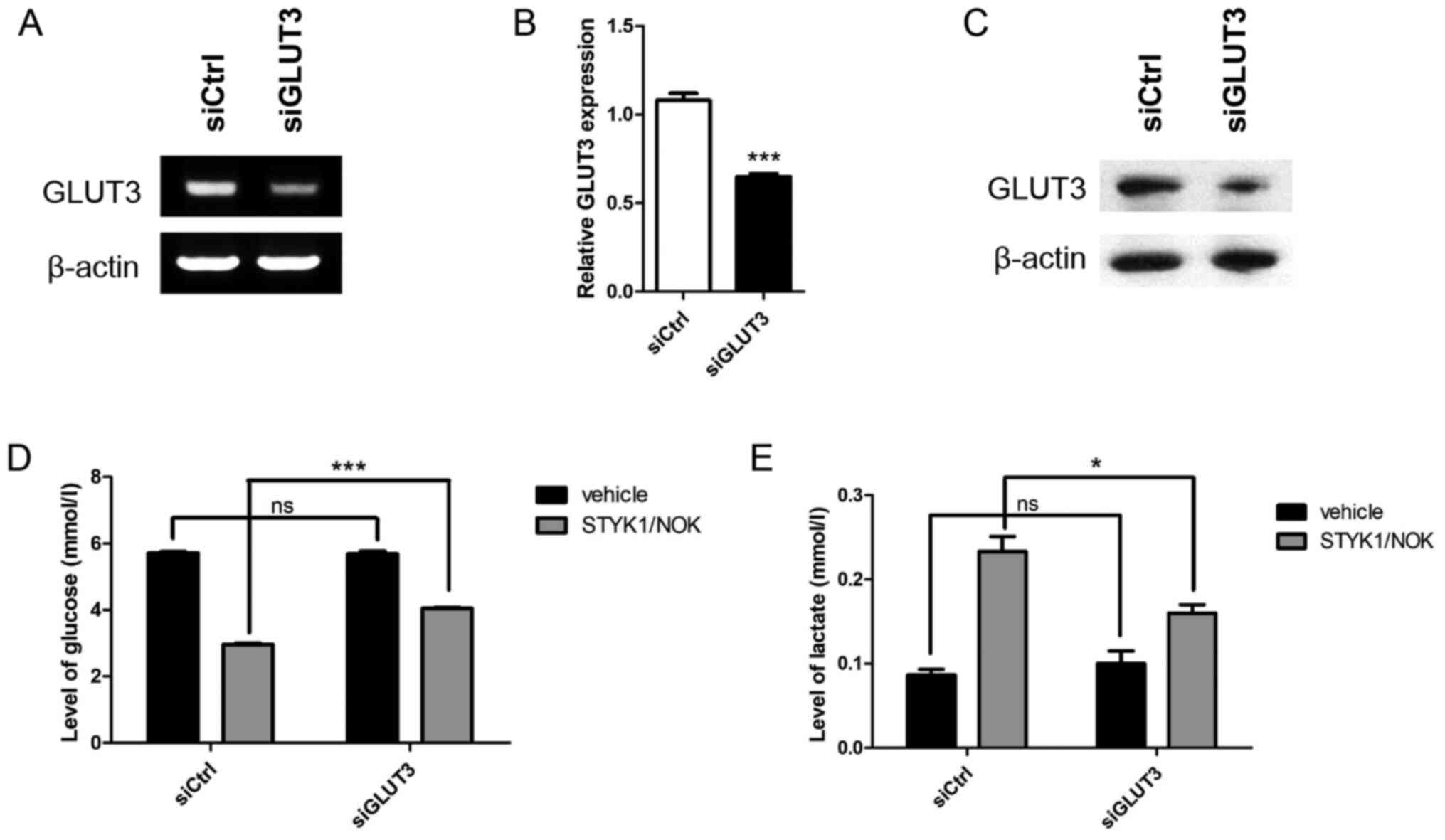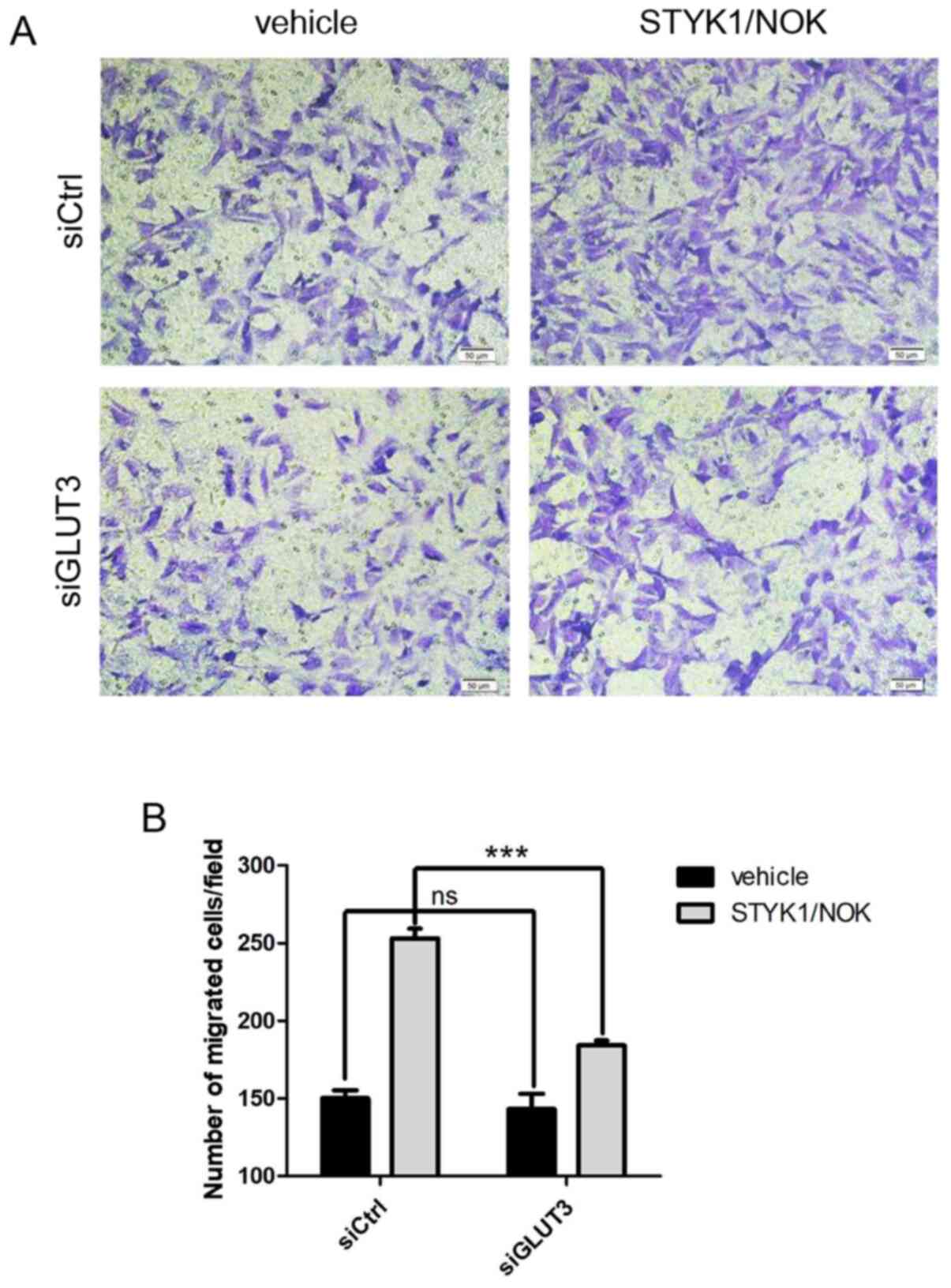|
1
|
Ye X, Ji C, Huang Q, Cheng C, Tang R, Xu
J, Zeng L, Dai J, Wu Q, Gu S, et al: Isolation and characterization
of a human putative receptor protein kinase cDNA STYK1. Mol Biol
Rep. 30:91–96. 2003. View Article : Google Scholar : PubMed/NCBI
|
|
2
|
Liu L, Yu XZ, Li TS, Song LX, Chen PL, Suo
TL, Li YH, Wang SD, Chen Y, Ren YM, et al: A novel protein tyrosine
kinase NOK that shares homology with platelet-derived growth
factor/fibroblast growth factor receptors induces tumorigenesis and
metastasis in nude mice. Cancer Res. 64:3491–3499. 2004. View Article : Google Scholar : PubMed/NCBI
|
|
3
|
Cao Q, Chen M, Li Z, Huang W, Jin Y, Ye X
and Tong M: High novel oncogene with kinasedomain (NOK) gene
expression is associated with the progression of renal cell
carcinoma. Clin Lab. 62:179–186. 2016. View Article : Google Scholar : PubMed/NCBI
|
|
4
|
Chen P, Li WM, Lu Q, Wang J, Yan XL, Zhang
ZP and Li XF: Clinicopathologic features and prognostic
implications of NOK/STYK1 protein expression in non-small cell lung
cancer. BMC Cancer. 14:4022014. View Article : Google Scholar : PubMed/NCBI
|
|
5
|
Jackson KA, Oprea G, Handy J and Kimbro
KS: Aberrant STYK1 expression in ovarian cancer tissues and cell
lines. J Ovarian Res. 2:152009. View Article : Google Scholar : PubMed/NCBI
|
|
6
|
Moriai R, Kobayashi D, Amachika T, Tsuji N
and Watanabe N: Diagnostic relevance of overexpressed NOK mRNA in
breast cancer. Anticancer Res. 26((6c)): 4969–4973. 2006.PubMed/NCBI
|
|
7
|
Orang AV, Safaralizadeh R, Hosseinpour
Feizi MA and Somi MH: Diagnostic relevance of overexpressed serine
threonine tyrosine kinase/novel oncogene with kinase domain
(STYK1/NOK) mRNA in colorectal cancer. Asian Pac J Cancer Prev.
15:6685–6689. 2014. View Article : Google Scholar : PubMed/NCBI
|
|
8
|
Chung S, Tamura K, Furihata M, Uemura M,
Daigo Y, Nasu Y, Miki T, Shuin T, Fujioka T, Nakamura Y and
Nakagawa H: Overexpression of the potential kinase
serine/threonine/tyrosine kinase 1 (STYK 1) in castrationresistant
prostate cancer. Cancer Sci. 100:2109–2114. 2009. View Article : Google Scholar : PubMed/NCBI
|
|
9
|
Shi WY, Yang X, Huang B, Shen WH and Liu
L: NOK mediates glycolysis and nuclear PDC associated histone
acetylation. Front Biosci (Landmark Ed). 22:1792–1804. 2017.
View Article : Google Scholar : PubMed/NCBI
|
|
10
|
Thorens B and Mueckler M: Glucose
transporters in the 21st Century. Am J Physiol Endocrinol Metab.
298:E141–E145. 2010. View Article : Google Scholar : PubMed/NCBI
|
|
11
|
Barrona CC, Bilan PJ, Tsakiridis T and
Tsiani E: Facilitative glucose transporters: Implications for
cancer detection, prognosis and treatment. Metabolism. 65:124–139.
2016. View Article : Google Scholar : PubMed/NCBI
|
|
12
|
Ganapathy V, Thangaraju M and Prasad PD:
Nutrient transporters in cancer: Relevance to Warburg hypothesis
and beyond. Pharmacol Ther. 121:29–40. 2009. View Article : Google Scholar : PubMed/NCBI
|
|
13
|
Zhao FQ and Keating AF: Functional
properties and genomics of glucose transporters. Curr Genomics.
8:113–128. 2007. View Article : Google Scholar : PubMed/NCBI
|
|
14
|
Shi Y, Liu S, Ahmad S and Gao Q: Targeting
key Transporters in tumor glycolysis as a novel anticancer
strategy. Curr Top Med Chem. 18:454–466. 2018. View Article : Google Scholar : PubMed/NCBI
|
|
15
|
Zhao M and Zhang Z: Glucose transporter
regulation in cancer: A profile and the loops. Crit Rev Eukaryot
Gene Expr. 26:223–238. 2016. View Article : Google Scholar : PubMed/NCBI
|
|
16
|
Alexandra C and Al-Hasani H: Glucose
transporters in adipose tissue, liver, and skeletal muscle in
metabolic health and disease. Pflugers Arch. 472:1273–1298. 2020.
View Article : Google Scholar : PubMed/NCBI
|
|
17
|
Reckzeh ES and Waldmann H: Development of
glucose transporter (GLUT) inhibitors. European J Org Chem.
2020:2321–2329. 2020. View Article : Google Scholar : PubMed/NCBI
|
|
18
|
Groves AM, Shastry M, Rodriguez-Justo M,
Malhotra A, Endozo R, Davidson T, Kelleher T, Miles KA, Ell PJ and
Keshtgar MR: 18F-FDG PET and biomarkers for tumour
angiogenesis in early breast cancer. Eur J Nucl Med Mol Imaging.
38:46–52. 2011. View Article : Google Scholar : PubMed/NCBI
|
|
19
|
Makinoshima H, Takita M, Saruwatari K,
Umemura S, Obata Y, Ishii G, Matsumoto S, Sugiyama E, Ochiai A, Abe
R, et al: Signaling through the phosphatidylinositol 3-Kinase
(PI3K)/mammalian target of rapamycin (mTOR) axis is responsible for
aerobic glycolysis mediated by glucose transporter in epidermal
growth factor receptor (EGFR)-mutated lung adenocarcinoma. J Biol
Chem. 290:17495–17504. 2015. View Article : Google Scholar : PubMed/NCBI
|
|
20
|
Liu H, Ertay A, Peng P, Li J, Liu D, Xiong
H, Zou Y, Qiu H, Hancock D, Yuan X, et al: SGLT1 is required for
the survival of triple-negative breast cancer cells via
potentiation of EGFR activity. Mol Oncol. 13:1874–1886. 2019.
View Article : Google Scholar : PubMed/NCBI
|
|
21
|
Whiteman EL, Chen JJ and Birnbaum MJ:
Platelet-derived growth factor (PDGF) stimulates glucose transport
in 3T3-L1 adipocytes overexpressing PDGF receptor by a pathway
independent of insulin receptor substrates. Endocrinology.
144:3811–3820. 2003. View Article : Google Scholar : PubMed/NCBI
|
|
22
|
Livak KJ and Schmittgen TD: Analysis of
relative gene expression data using real-time quantitative PCR and
the 2(-Delta Delta C(T)) method. Methods. 25:402–408. 2001.
View Article : Google Scholar : PubMed/NCBI
|
|
23
|
Zhuo Z, Hu J, Yang X, Chen M, Lei X, Deng
L, Yao N, Peng Q, Chen Z, Ye W and Zhang D: Ailanthone inhibits
Huh7 cancer cell growth via cell cycle arrest and apoptosis in
vitro and in vivo. Sci Rep. 5:161852015. View Article : Google Scholar : PubMed/NCBI
|
|
24
|
Bose S and Le A: Glucose metabolism in
cancer. Adv Exp Med Biol. 1063:3–12. 2018. View Article : Google Scholar : PubMed/NCBI
|
|
25
|
Warburg O: On respiratory impairment in
cancer cells. Science. 124:269–270. 1956.PubMed/NCBI
|
|
26
|
Warburg O: On the origin of cancer cells.
Science. 123:309–314. 1956. View Article : Google Scholar : PubMed/NCBI
|
|
27
|
Warburg O and Minami S: Versuche an
uberlebendem carcinom-gewebe. Klin Wochenschr. 2:776–777. 1923.
View Article : Google Scholar
|
|
28
|
Levine AJ and Puzio-Kuter AM: The control
of the metabolic switch in cancers by oncogenes and tumor
suppressor genes. Science. 330:1340–1344. 2010. View Article : Google Scholar : PubMed/NCBI
|
|
29
|
Hitosugi T, Kang S, Vander Heiden MG,
Chung TW, Elf S, Lythgoe K, Dong S, Lonial S, Wang X, Chen GZ, et
al: Tyrosine phosphorylation inhibits PKM2 to promote the Warburg
effect and tumor growth. Sci Signal. 2:ra732009. View Article : Google Scholar : PubMed/NCBI
|
|
30
|
Ji H, Lee JH, Wang Y, Pang Y, Zhang T, Xia
Y, Zhong L, Lyu J and Lu Z: EGFR phosphorylates FAM129B to promote
Ras activation. Proc Natl Acad Sci USA. 113:644–649. 2016.
View Article : Google Scholar : PubMed/NCBI
|
|
31
|
Li YH, Wang YY, Zhong S, Rong ZL, Ren YM,
Li ZY, Zhang SP, Chang ZJ and Liu L: Transmembrane helix of novel
oncogene with kinase-domain (NOK) influences its oligomerization
and limits the activation of RAS/MAPK signaling. Mol Cells.
27:39–45. 2009. View Article : Google Scholar : PubMed/NCBI
|
|
32
|
Li J, Wu F, Sheng F, Li YJ, Jin D, Ding X
and Zhang S: NOK/STYK1 interacts with GSK-3β and mediates Ser9
phosphorylation through activated Akt. FEBS Lett. 586:3787–3792.
2012. View Article : Google Scholar : PubMed/NCBI
|
|
33
|
Huang Z, Ma N, Xiong YL, Wang L, Li WM,
Lai YY, Zhang CX, Zhang ZP, Li XF and Zhao JB: Aberrantly high
expression of NOK/STYK1 is tightly associated with the activation
of the AKT/GSK3β/N-cadherin pathway in non-small cell lung cancer.
Onco Targets Ther. 12:10299–10309. 2019. View Article : Google Scholar : PubMed/NCBI
|
|
34
|
Song K, Li M, Xu XJ, Xuan L, Huang GN,
Song XL and Liu QF: HIF-1α and GLUT1 gene expression is associated
with chemoresistance of acute myeloid leukemia. Asian Pac J Cancer
Prev. 15:1823–1829. 2014. View Article : Google Scholar : PubMed/NCBI
|
|
35
|
Miller DM, Thomas SD, Islam A, Muench D
and Sedoris K: c-Myc and cancer metabolism. Clin Cancer Res.
18:5546–5553. 2012. View Article : Google Scholar : PubMed/NCBI
|
|
36
|
Ramos H, Calheiros J, Almeida J,
Barcherini V, Santos S, Carvalho ATP, Santos MMM and Saraiva L:
SLMP53-1 inhibits tumor cell growth through regulation of glucose
metabolism and angiogenesis in a P53-Dependent manner. Int J Mol
Sci. 21:5962020. View Article : Google Scholar : PubMed/NCBI
|



















